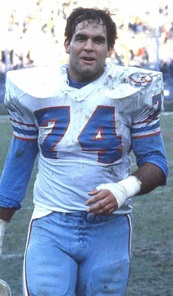Loading AI tools
From Wikipedia, the free encyclopedia
The Tennessee Titans are a professional American football team based in Nashville, Tennessee. The Titans compete in the National Football League (NFL) as a member of the American Football Conference South Division.[6] Founded in 1959 by Houston oil tycoon Bud Adams (who remained the owner until his death in 2013), they were a charter member of the American Football League (AFL) and joined the NFL in 1970 as part of the AFL–NFL merger.[7][8][9][10] The team was originally known as the Houston Oilers and began play in 1960 in Houston, Texas.[11] In 1997, the Oilers relocated to Nashville, Tennessee, playing at the Liberty Bowl Memorial Stadium in Memphis for one season while waiting for a new stadium to be constructed.[12][13] The team moved to Nashville's Vanderbilt Stadium in 1998.[14][13] The team was known as the Tennessee Oilers for the 1997 and 1998 seasons.[11][15] They changed their name to the Tennessee Titans for the 1999 season, when they moved into Adelphia Coliseum (now known as Nissan Stadium), where they have played their home games since.[11][15][16]

The NFL draft, officially known as the "NFL Annual Player Selection Meeting",[17][18][19] is an annual event which serves as the league's most common source of player recruitment.[20] The draft order is determined based on the previous season's standings; the teams with the worst win–loss records receive the earliest picks. Teams that qualified for the NFL playoffs select after non-qualifiers, and their order depends on how far they advanced, using their regular season record as a tie-breaker. The final two selections in the first round are reserved for the Super Bowl runner-up and champion. Draft picks are tradable and players or other picks can be acquired with them.[21]
Before the merger agreements in 1966, the AFL directly competed with the NFL and held a separate draft. This led to a bidding war over top prospects between the two leagues, along with the subsequent drafting of the same player in each draft. As part of the merger agreement on June 8, 1966, the two leagues began holding a multiple round "common draft". Once the AFL officially merged with the NFL in 1970, the "common draft" simply became the NFL draft.[22][23][24] The first AFL draft was held prior to the start of the 1960 season. The first round of the 1960 AFL draft was territorial selections. Each team received a "territorial pick" which allowed them to select a single player within a pre-agreed upon designated region (the team's "territory"). Teams then agreed on the top eight players at each position, who were subsequently assigned to teams by random draw, with each of the eight teams receiving one of those players. This process was repeated until all 53 roster spots were filled.[25] Beginning in the 1961 draft, the AFL, using the same system as the NFL, began to assign picks based on the previous season's standings.[26]
Since the team's first draft, the Titans have selected 61 players in the first round.[27] The team's first-round pick in the inaugural AFL draft was Billy Cannon, a halfback from LSU; he was the team's territorial selection.[25][28] The Titans have drafted first overall twice, selecting John Matuszak in 1973, and Earl Campbell in 1978.[27] In the most recent draft, held in 2024, the Titans chose Alabama tackle JC Latham.[29]
The Titans did not draft a player in the first round on ten occasions.[27] Five of the team's first-round picks—Robert Brazile, Earl Campbell, Mike Ditka, Bruce Matthews, Mike Munchak—have been elected to the Pro Football Hall of Fame;[30][31] one of these, Mike Ditka, chose not to play for the team and joined the Chicago Bears of the NFL instead.[32] The team's first-round pick in 1966, Tommy Nobis, also chose to sign with the NFL instead.[33]




| Symbol | Meaning |
|---|---|
| † | Inducted into the Pro Football Hall of Fame |
| * | Selected number one overall |
| ‡ | Selected number one overall and inducted into the Pro Football Hall of Fame |
| Position abbreviations | |
|---|---|
| CB | Cornerback |
| DB | Defensive back |
| DE | Defensive end |
| DT | Defensive tackle |
| G | Guard |
| LB | Linebacker |
| QB | Quarterback |
| RB | Running back |
| T | Tackle |
| TE | Tight end |
| WB | Wingback |
Seamless Wikipedia browsing. On steroids.
Every time you click a link to Wikipedia, Wiktionary or Wikiquote in your browser's search results, it will show the modern Wikiwand interface.
Wikiwand extension is a five stars, simple, with minimum permission required to keep your browsing private, safe and transparent.